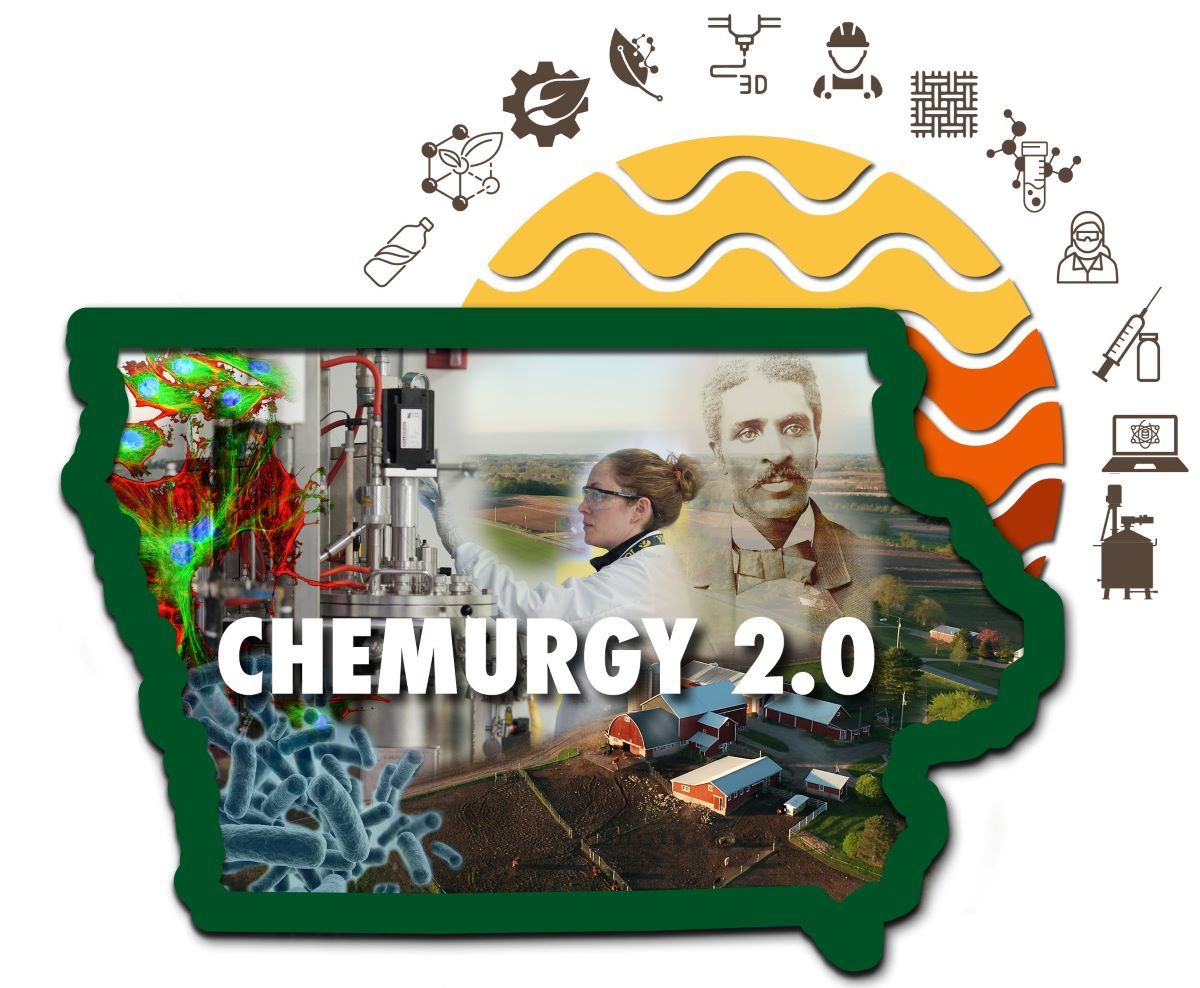
As part of a five-year, $20 million grant from the National Science Foundation, researchers across the state will work to adapt and modernize the concept of “chemurgy,” a term used by George Washington Carver to describe applied chemistry that produces industrial materials from crops. Larger image. Illustration by Jami Kenly.
AMES, Iowa – Researchers across Iowa will work together to build the knowledge, infrastructure and capacity for the state to be a leader in advanced biomanufacturing.
The National Science Foundation (NSF) will support the work with a five-year, $20 million grant from its Established Program to Stimulate Competitive Research (known as EPSCoR). The program is designed to build research capabilities and expertise across the country.
The NSF recently announced six of the $20 million awards, each supporting projects in Iowa, Idaho, Montana, South Carolina, Vermont and West Virginia.
“The NSF EPSCoR investment in Iowa will help Iowa State and our partner institutions create the technologies and develop the infrastructure and workforce that are needed to build and grow advanced manufacturing capacity in the state. These are critical steps in helping Iowa become a national leader across the bioscience platforms that are priority areas in the state’s science and technology plan.” said Surya Mallapragada, the chair of Iowa’s statewide EPSCoR Committee and an Iowa State associate vice president for research and the Carol Vohs Johnson Chair in Chemical and Biological Engineering.
The Iowa effort in microbe-based, advanced biomanufacturing will include researchers from Iowa State University in Ames, the University of Iowa in Iowa City, the University of Northern Iowa in Cedar Falls, Central College in Pella and Dordt University in Sioux Center.
“Iowa is known for supporting the human need for sustenance,” project leaders wrote in a summary. “Our vision is that Iowa also be known for supporting other human needs via advanced biomanufacturing.”
The project’s leader, Laura Jarboe of Iowa State, said the effort is built around adapting and modernizing the concept of “chemurgy,” a term used by George Washington Carver to describe applied chemistry that produces industrial materials from crops.
And then Jarboe quoted Carver, Iowa State’s first African American student and faculty member known for finding hundreds of uses for peanuts and other crops: “As Carver said, ‘We can learn to synthesize materials for every human need from things that grow.’”
Building a statewide effort
Jarboe, the Cargill Professor in Chemical Engineering at Iowa State, will lead the effort as project director. Monica Lamm and Nigel Reuel, associate professors of chemical and biological engineering at Iowa State, will be associate directors.
Institutional leads will be Manuela Ayee-Leong, associate professor of chemistry and engineering at Dordt; William Harwood, professor and head of chemistry and biochemistry at Northern Iowa; Aliasger Salem, the Bighley Chair and Professor of Pharmaceutical Sciences and associate vice president of research at Iowa; and Jay Wackerly, associate professor of chemistry at Central.
The researchers call their project, “Building Capacity across Iowa to Meet Human Needs from Things that Grow.” They’ve dubbed it “Chemurgy 2.0.” And they expect it to make a difference in the state.
“Overall,” the researchers wrote, “Chemurgy 2.0 addresses three intersecting problems: biomanufacturing, which is under-developed in Iowa relative to other sectors; the critical physical and cyberinfrastructure needs for biomanufacturing that are currently lacking; and workforce capacity, which is severely constrained in the state.”
Microbes as next-generation factories
Jarboe said Chemurgy 2.0 will use microbes and other biological systems as the factories that produce some of the molecules that manufacturers need.
“These little living systems can help us meet our material needs,” Jarboe said.
To do that, Jarboe said the project will support teams that connect researchers in the biosciences with researchers in advanced manufacturing, creating new and potentially long-term collaborations. The collaborations will build biomanufacturing expertise and products in three areas – plastics for 3D printing, fibers for flexible and rigid materials and proteins for medical diagnostics and therapeutics.
The project will also build the state’s research capacity by supporting equipment purchases such as high-performance computers at Northern Iowa, bioprocessing equipment at Iowa, polymer characterization equipment at Central and fiber-production equipment at Iowa State.
The project will also support new faculty hires, including a data science position at Northern Iowa, a microbial engineering position at Iowa and a biomanufacturing technology position at Iowa State.
There will also be efforts in education and workforce development, with an emphasis on working with first-generation college students and students from rural areas.
“Iowa has great strengths in the biosciences and advanced manufacturing,” Jarboe said. “This project will help build collaborations that bring these strengths together.”
Contacts
Laura Jarboe, “Chemurgy 2.0,” Chemical and Biological Engineering, 515-294-2319, ljarboe@iastate.edu
Mike Krapfl, News Service, 515-294-4917, mkrapfl@iastate.edu
Quotes
“These little living systems can help us meet our material needs.”
Laura Jarboe, “Chemurgy 2.0,” Chemical and Biological Engineering
Quick look
The National Science Foundation's program to build research capacity across the country has awarded a five-year, $20 million grant to support Iowa researchers working to make the state a leader in advanced biomanufacturing. The researchers will use microbes and other biological systems to produce plastics for 3D printing, fibers for flexible and rigid materials and proteins for medical diagnostics and therapeutics.
“The NSF EPSCoR investment in Iowa will help Iowa State and our partner institutions create the technologies and develop the infrastructure and workforce that are needed to build and grow advanced manufacturing capacity in the state. These are critical steps in helping Iowa become a national leader across the bioscience platforms that are priority areas in the state’s science and technology plan.”
Surya Mallapragada, Iowa’s statewide EPSCoR Committee, Iowa State's Office of the Vice President for Research, Chemical and Biological Engineering